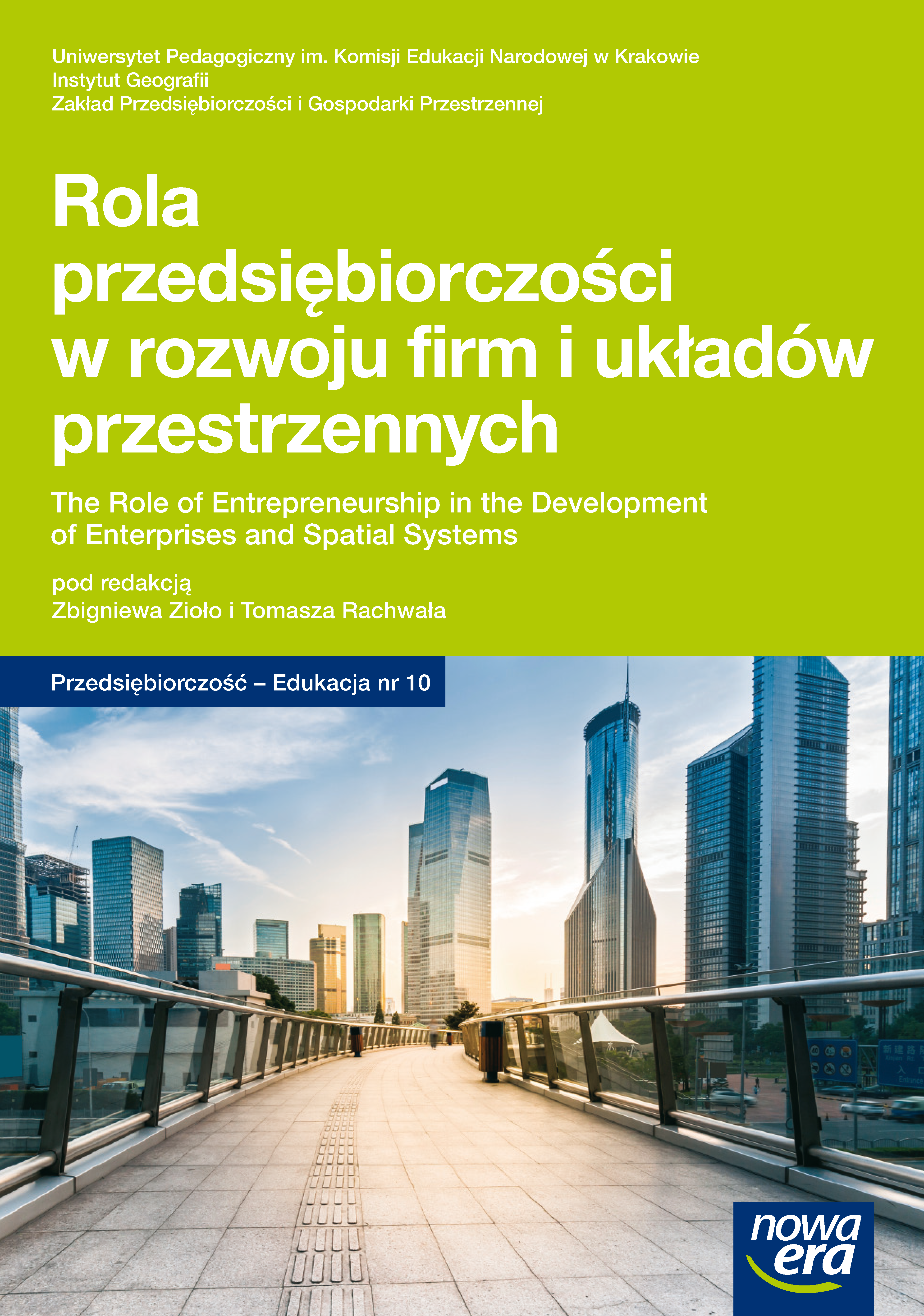Classical factors in enterprise location process on selected examples
DOI:
https://doi.org/10.24917/20833296.10.5Keywords:
classical location factors, enterprise location, location factors, location theoriesAbstract
This article is focused on the classical factors relating to a location and its importance in the process of choosing a convenient location for an enterprise. The leading classical theories were described in Spatial Management by A.Weber, A. Lӧsch, A. Predöhl and others. They concentrate on the traditional factors concerning a location, such as transport, labour cost, availability of raw materials or proximity to them. The paper offers an attempt to analyse the significance of factors influencing a decision-making process used by the contemporary entrepreneurs in connection with the location of their businesses. These analyses draw on results of direct marketing research on a sample of more than a dozen enterprises from the construction sector. The authors believe that, although the first theories on a location date back to 19th century, the classical factors affecting a location continue to be valid and important. If neglected in the decision-making process, they may contribute to a business failure in a longer run.References
Budner, W. (2004). Lokalizacja przedsiębiorstw. Aspekty ekonomiczno-przestrzenne i środowiskowe. Poznań: Wyd. Akademii Ekonomicznej w Poznaniu.
Całczyński, A. (1981). Modele i metody lokalizacji ośrodków dystrybucyjnych. Monografie i Syntezy, 14. Warszawa: IWHIW.
Domański, R. (2011). Gospodarka przestrzenna. Podstawy teoretyczne. Warszawa: PWN.
Dorocki, S., Rachwał, T., Szymańska, A.I., Zdon-Korzeniowska, M. (2012). Spatial Conditions for Agritourism Development on the Example of Poland and France. Current Issues of Tourism Research, 2(2), 20-29.
Dorocki, S., Szymańska, A.I., Zdon-Korzeniowska, M. (2012). Polskie gospodarstwa agroturystyczne jako przedsiębiorstwa rodzinne. Przedsiębiorczość i Zarządzanie, 8(8), 45-60 Dorocki, S., Szymańska, A.I., Zdon-Korzeniowska M. (2013a). Polskie gospodarstwa agroturystyczne w dobie kryzysu gospodarczego. Przedsiębiorczość – Edukacja, 9.
Dorocki, S., Szymańska, A.I., Zdon-Korzeniowska, M. (2013b). Agricultural tourism farms in Poland – how the farmers improve their businesses – the case study. Understanding Innovation in Emerging Economic Spaces, IGU-Ashgate.
Dziemianowicz, W. (1997). Kapitał zagraniczny a rozwój regionalny i lokalny w Polsce. Studia Regionalne i Lokalne, 21.
Fabińska, M., Piasecki, T., Benchmarking regionalny, Społeczna Wyższa Szkoła Przedsiębiorczości i Zarządzania w Łodzi, http://www.eedri.pl/pdf/187.pdf (data odczytu: 20.10.2013).
Fierla, I., Kuciński, K. (red.). (2001). Lokalizacja przedsiębiorstw a konkurencyjność. Warszawa: Wyd. Szkoły Głównej Handlowej w Warszawie.
Hoover, E.M. (1962). Lokalizacja działalności gospodarczej. Warszawa: PWN, 16-19.
Isard, W. (1956). Location and Space-economy. New York: J. Wiley and Sons.
Kupiec, L. (red.). (1999). Gospodarka przestrzenna. Lokalizacja w gospodarce przestrzennej, 33. Białystok: Wydawnictwo Uniwersytetu w Białymstoku.
Leśniak, J. (1985). Planowanie przestrzenne. Warszawa: PWN.
Lösch, A. (1940). Die räumliche Ordnung der Wirtschaft. Jena.
Perreur, J. (1992). Lokalizacja jednostek produkcyjnych. W: C. Ponsard (red.), Ekonomiczna analiza przestrzenna. Poznań: Wydawnictwo Akademii Ekonomicznej w Poznaniu.
Płaziak, M., Szymańska, A.I. (2014). Enterprise and Classical Factors of its Location on the market. Procedia. Social and Behavioral Sciences, 120, 13-22.
Płaziak, M. Szymańska, A.I. (2014). Role of modern factors in the process of choosing a location of an enterprise. Procedia. Social and Behavioral Sciences, 120, 72-83.
Pred, A.R. (1967). Behaviour and Location: Foundations for a Geographic Dynamic Location Theory. Part 1. Lund 1967, Studies in Geography, Series B. 27.
Rachwał, T. (2011a). Industrial restructuring in Poland and other European Union states in the era of economic globalization. Procedia. Social and Behavioral Sciences, 19, 1-10.
Rachwał, T. (2011b). Transformations of the employment structure as an expression of the transformation of the Polish industry against the background of the European Union. Bulletin of Geography, Socio- -economic series, 15, 5-25.
Rachwał, T. (2011c). Wpływ kryzysu na zmiany produkcji przemysłowej w Polsce. Prace Komisji Geografii Przemysłu Polskiego Towarzystwa Geograficznego, 17, 99-113.
Rachwał, T., Wiedermann, K. (2008). Multiplier effects in regional development: The case of the motor vehicle industry in Silesian voivodeship (Poland), Quaestiones Geographicae, 27B/1, 67-80.
Raźniak, P. (2012). Wpływ poziomu bezpieczeństwa społecznego na migracje ludności w Polsce. Bezpieczeństwo. Teoria i Praktyka, 4, 41-52.
Raźniak, P., Winiarczyk-Raźniak, A. (2013). Spatial distribution and differences in migration patterns and revenues of gminas in the Kraków Metropolitan Area. Bulletin of Geography. Socio-economic Series, 19, 73-86.
Stryjakiewicz, T. (2009). Nowe spojrzenie na czynniki lokalizacji działalności gospodarczej. W: I. Jażewicz (red.) Współczesne problemy przemian strukturalnych przestrzeni geograficznej. Słupsk: Wydawnictwo Naukowe Akademii Pomorskiej, 94-102.
Tobolska, A. (2011). Czynniki lokalizacji fabryk wybranych korporacji międzynarodowych w Polsce. W: M. Wdowicka, L. Mierzejewska (red.), Problemy rozwoju lokalnego i regionalnego na początku XXI wieku. Rozwój Regionalny i Polityka Regionalna, Biuletyn Instytutu Geografii Społeczno-Ekonomicznej i Gospodarki Przestrzennej UAM, 15.
Wieloński, A. (2004). Lokalizacja działalności gospodarczej. Teoretyczne podstawy. Warszawa: Wydawnictwo Uniwersytetu Warszawskiego.
Zawadzki, S.M. (1973). Polska, przestrzeń, społeczeństwo. Warszawa: PWE.
Downloads
Published
How to Cite
Issue
Section
License
Articles are published under the terms of the Creative Commons License (CC BY-ND 4.0; Attribution– NoDerivs).

